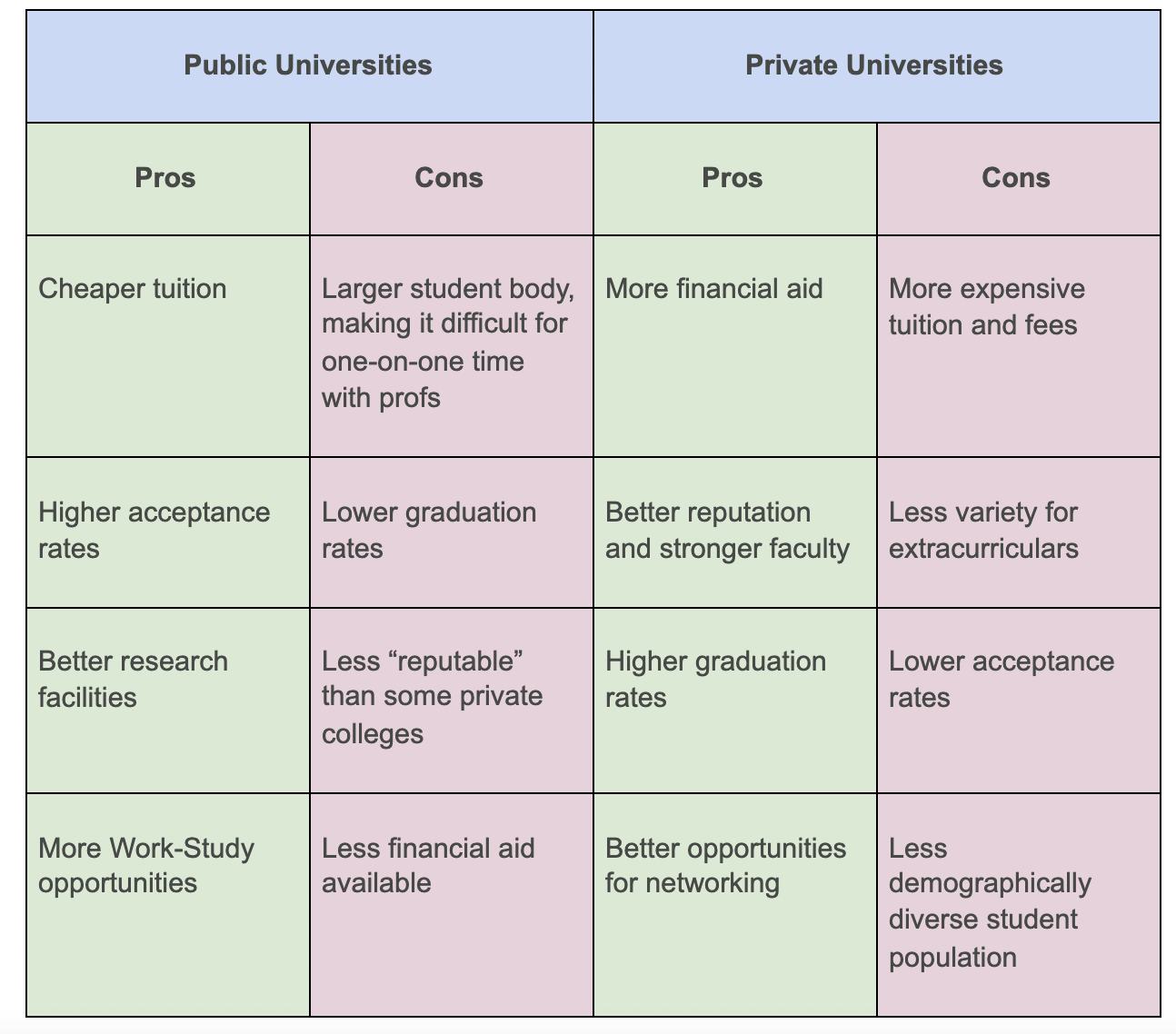Public Vs Private Colleges: Guide on the Difference Between Public and Private Colleges
The US has both private and public colleges, but what’s the difference between the two? Learn about the key differences between public vs private colleges.
Picking the right college is quite the ordeal. With so many options, how can one choose the best fit? One way to narrow it down is to consider whether you’d like to attend a private vs public college.
Overall, public colleges have cheaper tuition prices, larger student bodies, greater variety in majors of study, and lower graduation rates. Private colleges have higher tuition fees, smaller student bodies, and higher graduation rates. Don’t be alarmed by the graduation rates, though. They aren’t indicative of your success!
Let’s dive into public vs private colleges and explore exactly how your school experience changes with each option.
What are Public Colleges?
Public colleges are post-secondary institutions that receive a large portion of funding from state governments. Now, no US college is cheap. But, public colleges tend to be cheaper as a result of the government funding.
What are Private Colleges?
Private colleges are post-secondary institutions that receive minimal to no funding from state governments. Instead, they rely on alumni contributions and tuition fees to operate.
Private post-secondary institutions are either for-profit colleges or nonprofit colleges.
For-profit schools resemble businesses, as generating profit is a top priority. They have shareholders invested in the college to make a profit. Penn Foster College, Steven Henager College, CNI college , and Ashworth College are all for-profit colleges.
Nonprofit colleges hold education as their highest priority, making them more reputable than for-profit private colleges. Hiram College, AMES Christian University, University of People, and The Baptist College of Florida are all nonprofit schools.

What’s the Difference Between Public and Private Colleges
Private and public colleges offer different experiences for students in many different aspects of their education. Let’s go through each aspect and see how they look at public and private colleges.
1. Tuition and Fees
Public Colleges: Tuition fees and cost of attendance are usually cheaper at public colleges. Since they receive government funding, they rely less on student tuition to fund their operations.
2020-2021 Average Cost of Tuition and Fees: $18,809 for out-of-state students and only $8,487 for in-state students
Private Colleges: Private colleges don’t receive government funding, so they rely more heavily on student tuition to cover operating costs and education.
2020-2021 Average Cost of Tuition and Fees: $30,065
2. Class Sizes
Public Colleges: Class sizes are often in the hundreds at public colleges, making it difficult for students to get quality one-on-one time with their professors. Of course, there are still office hours at a public college.
Private Colleges: Class sizes are much smaller at private colleges, since the hefty tuition eliminates many students from being able to attend. Smaller class sizes are good for individuals that might need extra guidance in class. Additionally, it's easier to network at a private college with your professors.

3. Diversity
Public Colleges: Students are more demographically diverse at public colleges because they offer cheaper tuition.
Private Colleges: Private colleges are more geographically diverse, with students from all over the world. Demographically, they are less diverse since the high price tag prices out many, especially minority students.
4. Course and Program Options
Public Colleges: With a larger student population, public colleges must offer more variety in their degree programs. This is especially beneficial for students uncertain about what they’d like to major in.
Private Colleges: Private colleges offer fewer options for courses and degree programs. However, this is great if you already have a solid idea about what you’d like to study.
5. Financial Aid
What can affect whether a public or private university is affordable? Financial aid. Even if the tuition tag is lower than that of other colleges, that price is still expensive if the school doesn’t offer adequate financial aid.
Public Colleges: You can use federal financial aid to assist with your tuition fees for a public college. The college itself might also have some financial aid available, but there might not be as much of it as there would at a private college, and you might face more competition to get it.
Private colleges: Private colleges often have generous donors and other resources to provide more financial aid options for students than public colleges.
6. Quality of Education
Many factors contribute to an education’s quality.
Public Colleges: Students will enjoy more extensive research opportunities and facilities at public universities. DEspite well-qualified faculty, public colleges might not have the same renowned staff that private universities offer.
Private Colleges: These colleges don’t usually offer the same research facilities as public universities, since they don’t get the extensive funding for these facilities that public colleges do. However, some private research universities have impressive facilities, like the John Hopkins University. Moreover, private colleges have faculty with impressive qualifications. The best professors teach at the most prestigious universities, like Harvard and Stanford.

7. Work Availability
By work availability, we mean the opportunities for part-time employment or work-study arrangements while attending school.
Public Colleges: We mentioned earlier that public colleges might not offer the same financial aid opportunities that private colleges offer. However, public colleges tend to have greater availability and variety of work-study programs for students.
Private Colleges: Private colleges don’t offer many work-study programs, but they make up for it with impressive financial aid packages.

8. Extracurricular Activities
Extracurriculars encompass school sports, hobby clubs, and culture, and arts associations.
Public Colleges: Public colleges are known for having the most formidable college sports teams. Just look at the UCLA Bruins, or the University of Florida Gators! If sports are important to you, you’re better off at a public university, since they offer superior facilities and a wider variety.
Private Colleges: Private colleges certainly offer extracurricular programs; however, you’ll find more variety at public colleges.
Public University vs Private University: Pros and Cons

Top 10 Private Colleges
Here’s a list of the top 10 private colleges in the USA.
|
Name of the College |
Acceptance Rate |
|
7% |
|
|
5% |
|
|
4% |
|
|
6% |
|
|
6% |
|
|
8% |
|
|
9% |
|
|
7% |
|
|
8% |
|
|
Dartmouth College |
8% |
Top 10 Public Colleges
Here’s a list of the top 10 public colleges in the USA.
|
Name of the College |
Acceptance Rate |
|
14% |
|
|
18% |
|
|
26% |
|
|
23% |
|
|
37% |
|
|
31% |
|
|
24% |
|
|
38% |
|
|
30% |
|
|
21% |
Conclusion
When deciding on your dream school, it’s important to consider the educational experience of a public vs private college. The difference between public and private colleges might be the kicker for your decision!
Both public and private schools offer you great quality of education and ample opportunities for work in the future. Some of the most successful people attend public colleges, just like they do private ones. If you’re still deciding on your educational path, check out our article about how to choose a major!
Blogs You May Be Interested In:
Frequently Asked Questions
1.What is Public College?
Public institutions are colleges that operate under the ultimate control of a state or local government. Public colleges are funded by the government authorities.
2.What is Private College?
Private colleges and universities are controlled by a board of trustees and do not receive direct funding from the state. However, students attending the institution may pay for it with public financial aid. Private colleges usually charge 2 to 4 times the tuition of public institutions.
3.Difference between public and private colleges?
The major difference between public universities and private colleges lies in how they are funded. This affects students because funding is tied to tuition prices.
4.What are the advantages of Public Colleges?
The Benefits of Public and State Universities Lower Tuition Costs. Public universities collect a large portion of their operating funds from Federal and local State governments. Prosperous and World-renowned Facilities and Faculties. Diverse Student Body. Competitive Atmosphere.
5.What are the advantages of Private Colleges?
Advantages of Private Colleges are- Committed professors. Professors have more time to spend with their students to ensure they achieve their academic goals. Merit scholarships and other financial incentives.